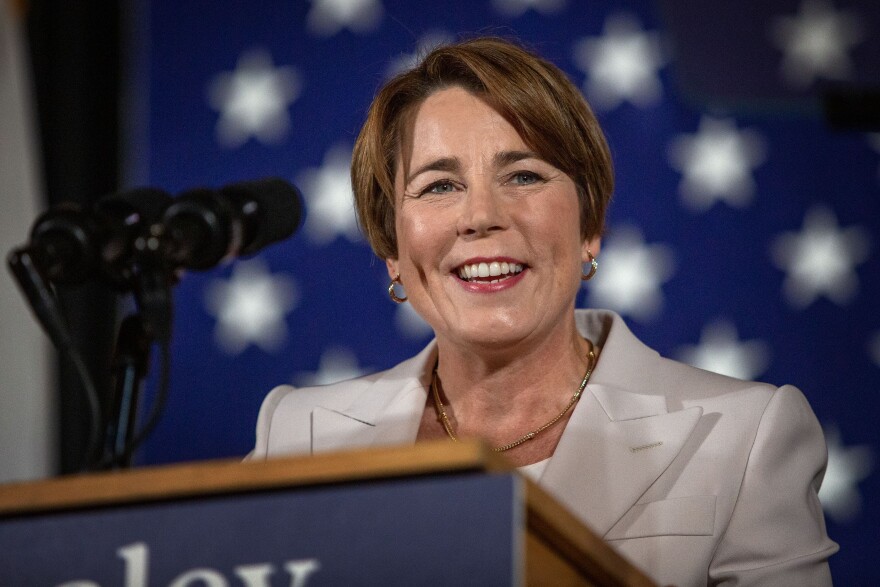Maura Healey scored a decisive and historic victory Tuesday night, becoming the state’s first elected female and first openly gay governor as well as the nation’s first openly lesbian governor.
The Massachusetts attorney general overwhelmed her Republican opponent, former state Rep. Geoff Diehl, and put the governorship firmly back in Democratic hands after Republican Gov. Charlie Baker declined to run for a third term.
The race was called by The Associated Press almost immediately after the polls closed.
Salem Mayor Kim Driscoll will join Healey on Beacon Hill as lieutenant governor. Together, they are the nation’s first all-women tandem to serve as governor and lieutenant governor.
Diehl garnered support from former President Trump and many fellow Republicans, but he struggled to win over moderates and conservative Democrats, whose votes are crucial for Republicans to win in a state as blue as Massachusetts.
Healey, who had already won statewide office twice, held a huge advantage in fundraising and name recognition, and consistently held large leads in polls throughout the campaign.
Speaking to supporters shortly before 10 p.m. Tuesday, Healey leaned into the historic nature of her ascension to the office.
“Tonight, I want to say something to every little girl and every LGBTQ person out there. I hope tonight shows you that you can be whatever, whoever, you want to be,” Healey said to an eruption of applause at the Fairmont Copley Plaza in Boston.
Healey also noted many of the long list of Democratic priorities she campaigned upon, including expanding affordable housing, promoting green jobs and improving transportation across the commonwealth.
“Let’s put money back in people’s pockets by cutting the costs of housing, energy and health care,” Healey said when she accepted the party nomination at the Massachusetts Democratic convention in Worcester last June. “Let’s create more housing so people who live here and come here can afford to stay here.”
Healey pledged to create a cabinet-level job to oversee housing and accelerate permitting and construction of new homes across the state. Her proposals include making state land available for development, while offering financial help for first-time home buyers, low-income residents and the elderly.
In response to the climate crisis, Healey vowed to achieve net-zero emissions by 2030, while making Massachusetts “a hub for clean energy innovation.” She also promised to use an influx of federal funding to improve public transportation, including the state’s subway, trains, ferries and buses, while fixing crumbling roads, bridges and tunnels.
Healey’s victory ends a campaign that hardly faced serious challenges. Several other Democrats, including state Sen. Sonia Chang-Díaz, all dropped out of the race before the primary, giving her a clear path to the Democratic nomination.
Diehl, a conservative on both fiscal and social issues, easily defeated businessman Chris Doughty in the GOP primary. But he never came close to matching Healey in polls for the general election, where Republicans have historically achieved more success with moderates like Baker, Mitt Romney and William Weld.
Healey, 51, grew up on the New Hampshire coast. By the time she was 10, her parents had split up. She lived with her mother, a school nurse, along with two sisters and two brothers. Eventually, she found success in sports.
She told WBUR last spring that her mother sold her wedding ring to pave a basketball court behind their house.
“And that’s where I think probably a lot of my basketball career took off,” Healey said.
Basketball took Healey through Harvard University, where she co-captained the women’s team, and then to Austria, where she played professionally for two years. Healey, who was a point guard, said she has always been comfortable playing basketball, despite her height.
“I never even realized how short I was,” Healey said. “Being that small and playing that game I think you learn a little bit about toughness. You learn about taking on bigger people and bigger interests.”
She also took on big challenges in her legal career. While working for Massachusetts Attorney General Martha Coakley, she helped go to court to challenge the federal Defense of Marriage Act, the 1996 law that allowed states to deny rights to same-sex married couples. And as attorney general, Healey joined with other states to fight new restrictions on abortion.
Healey was elected attorney general in 2014, becoming the first openly gay person to hold that position, and later she won a second term. But she won national attention by taking on Trump.
Her office initiated or joined dozens of legal challenges against the Trump administration, many of which were successful. That includes challenging Trump’s travel ban and fighting to maintain a law that protects children brought illegally to the U.S. as children.
Healey also filed a lawsuit to protect portions of the Affordable Care Act. She repeatedly sued the Department of Education for failing to protect student lenders from fraud. And she sued or helped sue the head of the Environmental Protection Agency multiple times for halting, delaying or rolling back environmental regulations.
As the state’s top law enforcer, Healey also took on some of the country’s most powerful corporations, including Exxon Mobil, which she sued for lying about climate change. And she took action against Purdue Pharma and the Sackler family for their role in fueling the opioid epidemic.
Becoming attorney general hasn’t always been the clearest path to the governor’s office. The last three attorneys general who ran for the office lost. But Healey’s victory vanquished the so-called “attorney general’s curse,” while instantly boosting her profile as a leader in the LGBTQ community across Massachusetts and the country.
“I’m proud of who I am,” Healey told WBUR last June. She said she is especially moved when young people from that community say they feel comforted by her success. “Kids need to understand and believe that they are loved, they are seen and that they can be whoever they are.”
This article was originally published on WBUR.org.
Copyright 2022 WBUR. To see more, visit WBUR.




